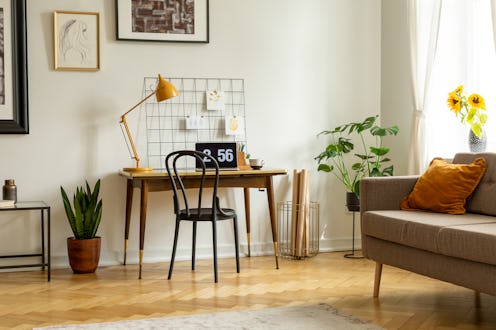(Living)
No Office, No Problem: This Expert Tip Transforms Your Living Room Into A Home Work Space

Unless working remote is your norm, you've probably been thrown a major curve ball recently, now that strict stay-at-home policies have been set in place in nearly every state. But — deep breaths — you can totally do this, and one way to stay motivated and inspired to keep the work grind going is by having a home space that's conducive to productivity and free from distraction. Don't have a designated home office? You can still make the most of what you've got by turning your living room into an office — especially with a few expert tips that can make it as chic as it is effective.
Ask anyone who's accustom to working from home and they'll tell you that one of the biggest challenges is separating your space into a "work zone" and living zone, so that you can keep some sense of calm and sanity and not feel consumed by work projects 24/7. "I'm a big believer in dedicating certain zones in your home to specific activities," says Vancouver-based designer Karin Bohn of House of Bohn. "For example, using your bedroom for sleep only, versus your living room for relaxation and TV, allows you to engage completely in the activity without distraction."
That said, having a great workspace can certainly optimize focus and efficiency when it comes to work." And according to the interior expert, your living room can actually be surprisingly conducive to this, just follow her advice for carving out a nook that will make the transition so much easier — not to mention more stylish.
Tidy Up
First things first: Get rid of as much unnecessary clutter as possible to allow for a bit more room and less visual noise. "Clean out one area so that you can dedicate it to work," Bohn suggests. "Whether it's a shelf or extra storage in your coffee table, dedicate an area to all of your work gear so that it's easily accessible, but also doesn't feel like it's taking over your living room."
Go Towards The Light
Where to set up shop? Bohn recommends finding a corner or space close to a window if possible. "Natural light is both invigorating and soothing at the same time, so having a work set-up close to [it] is ideal," she says.
Keep Distractions At Bay
"If you're typically used to using your living room for multiple activities, say like watching TV, hanging out, social media, and even eating, then you might want to try to keep devices like your phone and remote controls a little further than arm's reach so that you resist the urge to constantly get distracted," Bohn says. "Set up your environment so that you've got water and coffee nearby, turn the TV off, and put your phone on silent. This way, you can focus on the task at hand."
Use An Actual Desk, If Possible
If you don't already have a desk, Bohn suggests getting one to help you compartmentalize the space. And if you don't have a window do place your desk near, consider setting it up like a console table behind your sofa. "This will help create a super functional zone that's still very connected to your living room," she says.
If Not, Maximize Your Existing Setup
"Alternatively, if space doesn't allow for a desk, then I would absolutely set up a 'work zone; in your living room," Bohn says. "That could be a comfortable grouping of pillows on the floor with your laptop arranged in a certain way on your coffee table, it could a comfortable lounge chair by the window where you can perch a cup of coffee and sit for a long period of time, or it might even be an ideal lighting set up with brighter lights that makes you feel like you're at the office instead of lounging at home."
Add Inspiring Details
Lastly, bring the space to life and make it a pleasant place to be by adding details like plants, decorative accents, or even statement furniture pieces. "Bring in fresh flowers — there's no better way to brighten up a space, especially a work space," says Bohn, who also advises finding furniture that adds some pizzazz. "The perfect desk chair can add a splash of personality and design to a space, and with all the working-from-home ahead of us, it'll be worth the investment!"
If you think you’re showing symptoms of coronavirus, which include fever, shortness of breath, and cough, call your doctor before going to get tested. If you’re anxious about the virus’s spread in your community, visit the CDC for up-to-date information and resources, or seek out mental health support.
This article was originally published on